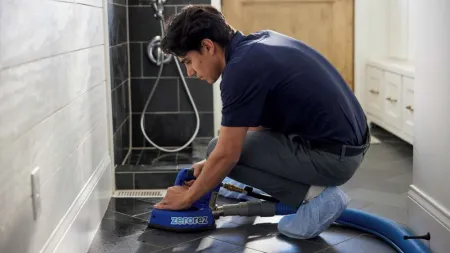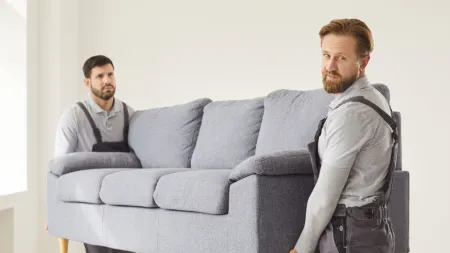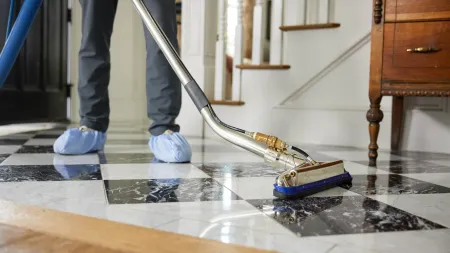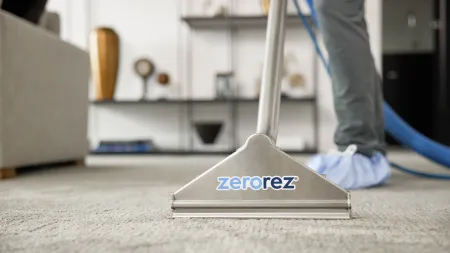Can You Vacuum Hardwood Floors? Yes-And Here's Why You Should
Hardwood floors are a timeless choice that adds warmth, character, and elegance to any home. But when it comes to keeping them clean, confusion often sets in—especially about whether or not vacuuming is safe. Is it better to mop? Should you use a damp cloth? Can vacuuming damage hardwood floors? Many people rely on a broom for regular cleaning, but there are important differences between sweeping and vacuuming.
Let's clear things up: yes, you can vacuum hardwood floors—and in many cases, you should. Regular cleaning routines, whether using a broom or a vacuum, are essential for maintaining the cleanliness and longevity of your hardwood floors.
Why Vacuuming Hardwood Floors Is a Smart Choice
Hardwood floors might look smooth and shiny, but they naturally have small grooves and seams where dirt, sand, and debris settle. Over time, that buildup can wear down the finish and scratch the surface. Sweeping is helpful, but vacuums do a better job than sweeping at removing dust and debris from hardwood floors, as they are more efficient at lifting fine particles that get trapped in those crevices. Vacuums with soft bristles are less likely to scratch hardwood floors compared to those with stiff bristles, making them a safer choice for maintaining your floor's appearance.
Unlike mops, which tend to push dirt around or leave moisture behind, vacuuming removes debris without residue, helping protect your floors from dulling and long-term damage.
The Problem with Mopping Alone
Many homeowners rely on traditional mopping to clean their hardwood surfaces. But unless done carefully, it can backfire. Too much water or the wrong cleaning solution (like vinegar or soap-based products) can leave behind a sticky residue. That residue attracts dust and can make your floors look hazy or even damage the finish over time.
Mops also don't capture dirt—they mostly smear it around. This means particles that could scratch your floor are left behind, causing micro-abrasions with every step you take.
Choosing the Best Vacuum for Hardwood Floors
Not all vacuums are created equal, especially when it comes to hardwood floors. Using the wrong type of vacuum can lead to scratches, dulling, and even permanent damage to your floors' finish. That's why selecting the right vacuum is just as important as the act of vacuuming itself.
Here's what to look for when choosing a vacuum for hardwood surfaces:
1. Skip the Beater Bar
Vacuum cleaners with rotating brushes (sometimes called beater bars) are great for pulling debris from carpet, but they can be too aggressive for hardwood. If your vacuum has a brush roll, make sure you can turn it off when cleaning hard floors. Otherwise, the bristles may leave fine scratches or scuffs over time.
2. Opt for a Hard Floor Attachment
For the best clean with the least risk, choose a vacuum with a dedicated hard floor tool or soft-bristle brush. These attachments are designed to glide smoothly over hardwood, lifting dust and debris without abrasion.
3. Choose Rubber or Felt-Coated Wheels
Wheels matter more than you might think. Hard plastic wheels can scuff or dent softwood floors. Look for vacuums with rubberized or felt-lined wheels to protect your surfaces as you clean.
4. Canister vs. Upright Vacuums
Canister vacuums are typically more maneuverable and versatile when it comes to cleaning hardwood, especially when paired with a long, oval-shaped floor brush. That said, if you're using an upright model, make sure it's specifically labeled as safe for hardwood and has adjustable height settings.
5. Lightweight and Easy to Maneuver
A vacuum that's too heavy can be difficult to use regularly and might leave marks if dragged or dropped. A lightweight model with swivel steering will help you clean more efficiently, especially in tight corners and under furniture.
How to Vacuum Hardwood Floors the Right Way
If you want to get the most out of your hardwood vacuuming routine, follow these quick tips:
Use a vacuum designed for hard surfaces. Canister vacuums with soft-bristle floor attachments are ideal for hardwood. Avoid standard upright vacuums with rotating brushes unless the brush can be turned off.
Check the wheels. Rubber wheels are gentler on your floors than hard plastic ones.
Vacuum at least once a week. High-traffic areas may need even more attention, especially if you have pets or children.
Bonus Tip: Go Shoe-Free Indoors
One of the easiest ways to protect your hardwood floors? Leave your shoes at the door. Shoes track in dirt, pebbles, and grit from the outside world-tiny abrasives that can scratch your floors before you even realize it. A no-shoes policy helps cut down on cleaning frequency and reduces wear and tear.
When Vacuuming Isn't Enough: Zerorez Hardwood Floor Cleaning
Vacuuming is a great day-to-day maintenance tool, but over time, grime builds up in ways your vacuum can't handle. That's where Zerorez comes in.
Our professional hardwood floor cleaning process goes beyond the surface to safely and thoroughly deep clean your floors without soaps, detergents, or harsh chemicals. Thanks to our proprietary Zr™ Water, we can clean and refresh hardwood without leaving behind residue that attracts dirt.
This means your floors stay cleaner, longer, and look beautiful for years to come.
Take the guesswork out of hardwood floor care. Vacuum weekly, skip the harsh chemicals, and schedule your professional Zerorez hardwood cleaning when your floors need a refresh.
Ready to see the difference?
Contact your local Zerorez team to schedule your service today and experience {{ the-zerorez-difference }} for yourself.



